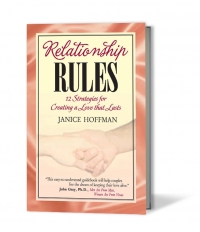Janice Hoffman Interview – 12 Strategies For Creating A Love That Lasts
“12 Strategies for Creating a Love That Lasts”
Jasbina Ahluwalia interviews Janice Hoffman
In 1996, Janice Hoffman was personally trained by Dr. John Gray, bestselling author of the Mars Venus empire. Working closely with Dr. Gray, Janice facilitated the various Mars Venus Workshops, including training over 550 Mars Venus Facilitators worldwide.
From that passion, Janice condensed the concepts in Men Are From Mars, Women Are From Venus into her own book, Relationship Rules: 12 Strategies For Creating A Love That Lasts.
_____
(00:59): Hello everyone and welcome to Intersections Match’s Talk Radio, a monthly holistic lifestyle show focused on the continual evolution into the best versions of our authentic selves. We and our guests discuss relationships and health and wellness, each of which contributes to meaningful and fulfilling lives.
This is Jasbina, your host. I’m a former practicing lawyer and the Founder of Intersections Match, the only elite national personalized matchmaking company focused on singles of South Asian descent nationwide in the US.
I’m very excited to welcome Janice Hoffman to our show tonight. Janice has worked closely with her mentor, Dr. John Gray author of the bestselling Mars Venus books. Janice was Dr. Gray’s very first facilitator with the Mars Venus Institute and has trained over 550 Mars Venus Workshop facilitators and counselors worldwide as well as developed curriculum for the Mars Venus Institute.
Tonight, we’ll be discussing Janice’s book, Relationship Rules. Welcome, Janice.
Janice Hoffman
(2:07): Hello. Thanks for having me.
(2:11): It’s a pleasure. As a professional dating coach and matchmaker, I’m fascinated by insights and perspectives regarding relationships.
I’ve thoroughly enjoyed reading your book and would love to explore some of the insights shared in your book. Janice, what prompted you to write this book in the first place?
Janice Hoffman
(2:30): One of the things that I realized in doing all the work that I did with John Gray and the Mars Venus Institute is that people are really good at falling in love, but we don’t really have the skills for staying in love.
Breakups and divorces are really hard on the families and children. I wanted to give people some easy-to-use guidelines for how to keep love alive. That was the purpose of the book.
(2:58): In your book, you discuss 12 strategies for creating a love that lasts. I’d like to share 6 of the 12 rules discussed in your book with our listeners. I’ll read each of the six rule aloud for the benefit of our listeners. After sharing each one, I’ll invite you to explain the underlying concept to our listeners as well as share any example or anecdote from your experiences to bring these valuable concepts home for our listeners.
Let’s jump in. the first of the six rules is to help your partner relieve stress. Please tell us about that, Janice.
Janice Hoffman
(3:59): Men and women relieve stress differently. Our brains are naturally wired differently. The connective tissue that connects the left and right side of the brain is different for men and women. How a man will go about relieving a stressful day at work is going to be very different than how a woman would go about relieving stress.
Typically, a woman will want to talk about what’s bothering her. It’s as if the words have to physically pass our lips and get out to the other side. If someone can empathize and understand how we feel, even better. That’s how we relieve stress. We relieve stress by knowing that someone feels our pain. They identify with what we’re feeling. We feel a connection with them. When we make that connection, as women, we’re able to let it go.
Whereas, men have this wonderful ability to disassociate. They don’t have the need to talk about what’s bothering them and process and journal, like women. It’s because of their ability to disassociate. It has served them well over the years because, when we needed food for dinner and they had to go out and hunt, they didn’t look at a deer and think it was Bambi. They got the job done because they could disassociate from their feelings.
It’s about understanding how a woman processes stress and not expecting her to be like her partner, and vice versa understanding how he likes to process it. Many men like to be alone and figure things out for themselves. They don’t need to talk about it.
The idea of being alone is totally foreign to women. We don’t understand their need to pull away. Then we take it personally. That’s why it’s valuable to know how men process their stress. It’s so that we don’t take it personally. There is a whole myriad of things that come from that, which can cause more separation in the relationship.
(5:55): That’s very insightful. You explained it so clearly. Is there any example that comes to mind?
Janice Hoffman
(6:12): Yes, you can take this example. You just had a fight with your spouse. Either you or your partner says, “I can’t do this anymore,” and storms off to the bedroom. Let’s say it’s the wife who storms off to the bedroom. She’s upset. She’s crying. Maybe she calls a friend. A few minutes later, she starts to realize that they only have so much time together because the kids are with Grandma.
This is their one night to be alone. She wants to make the best of it. She starts reevaluating. Maybe she was a little too quick to judge. She opens the door and walks out into the family room to make up with her husband. She sees him sitting in the Lazy Boy fully outstretched with a beer and a bag of Doritos, watching TV and looking perfectly happy. He doesn’t even see her.
She thinks, “How could he possibly be enjoying himself when we just had this major fight? I don’t even know if our relationship is going to last because of it. He’s enjoying a beer and football?” She goes back into the bedroom.
He doesn’t even know that she came out to make up. He has no idea. He’s in the doghouse because he’s doing what his brain is wired to do, disassociate. He’s taking a vacation from the argument that they just had because he has the ability to do that. As women, we don’t have the ability.
We’re hitting every wall, saying, “How do I make sense of this? How do I put this back together?” If we only knew that men need their space when they have a problem or they’re stressed out. One of the things that women can do with their partners is to say, “I’m really stressed out. I really need to talk about this problem. I don’t need you to fix it. I just need 10 minutes. If you could listen, not play devil’s advocate and not judge me, I will be in such a good mood the rest of the evening.” What man wouldn’t say yes to that? We don’t know to ask for what we want.
(8:08): That makes complete sense. You’re giving him the game plan of how he can help you.
Janice Hoffman
(8:19): Men love that. They think, “You just told me what my job description is? That’s excellent. I don’t have to try and guess.” They hate guessing.
(8:26): They think, “Now I can fulfill it and we’ll both we happy.”
The second of the six rules that I’d like to share is to appreciate your partner for their efforts, big and small. Tell us about that one, Janice.
Janice Hoffman
(8:50): In the Mars Venus books, John Gray had a chapter where he talks about how men and women keep score. A lot of people will say, “I don’t keep score.” We keep an emotional score. Let’s say that you’re doing everything in the relationship and your partner doesn’t seem like he’s pitching in or helping. Women have this thing.
They think, “Any second now, they’re going to realize what a wonderful person I am and they’re going to come around. I will get the appreciation that I deserve.” She keeps a smile on her face. She keeps doing things for him. In his world, he’s thinking, “I must be doing something right because she’s doing things for me with a smile on her face.” He continues to do nothing.
He figures that he must be doing something right because she’s so happy. It goes to show you how far apart we are sometimes in relationships. One day, she says, “I’m tired of doing everything. I’m out of here. I’m done.” He doesn’t understand. That’s the thing about keeping score. One day, we get tired of not being appreciated.
You can practice this instead for one week. Do it every day for seven days. Find one thing that you can appreciate. Some people say, “I can’t find anything about my partner that I can appreciate.” Do they go to work? Did they come home from work? Are they kind to you? It doesn’t have to be a big thing. Find something that you appreciate about your partner and let them know.
Men think, “If I buy the house and the car, I get the big-paying job, that will make her happy. Then she’ll be quiet for a while. Then I won’t have to work so hard to keep her happy.” Sorry, but that’s what they think. They go for the big things. They don’t realize that it’s the little things.
As women, we have this formula. It’s this unconscious thing that we do. At any moment, any day at any time, we add what you do, say and give together. That’s what we interpret as how much you care about us. It’s constantly changing. Some days, we might feel like you care a lot. Some days, we don’t feel like you care at all, and everything in between. We’re constantly reevaluating the relationship.
That is how our brains are wired. It’s not a fault or some problem women have that they need to correct. There are certain things that can’t be corrected. Women have a need to connect. Our brains are wired that way. We can’t change it. If you can’t change it, how can you work with our differences? That’s the beauty of the differences between men and women and exploring that. Go with how men and women are and figure out how to make that work rather than fighting the tide and trying to make them be like you.
(11:36): I love that. If you can’t change, figure out how to work with it. I think that applies to life in general.
The third of the six rules that we will discuss is to know how men and women keep score in a relationship. We’ve already discussed that. Do any examples come to mind?
Janice Hoffman
(12:12): The part that applies in that particular rule is letting men off the hook. Women don’t know the value of letting someone off the hook. Women keep score. If my partner gave me a dozen roses, maybe he’d get one or two points. If he gave me one rose for 12 days, he would get more than 12 points. It’s the act of caring. It’s the fact that you thought of me.
You stopped what you were doing, went somewhere and purchased something. You signed the card and brought it home. You put together the moment to present it to me. It’s all those things. That’s what I mean by the “do, say, give formula.” We love all those acts of caring. We think that men want to do the same. I was dating someone one time. He came into my life and he was an angel.
His birthday was shortly after we started dating. I was making these angels with feather wings, iridescent powder and dried flower halos. They were just gorgeous. I made them for my girlfriends. They all loved them. I thought, “I’ll make one for him. He’ll love it like all of my friends did.” There was this big anticipation. He opens the wrapping. He lifts up the box and sees this angel inside.
I’ll never forget the look on his face. He told me later that the first thing that came to mind was, “What am I going to do with this?” I was just devastated. We think that men want to have those little acts of kindness all the time to show that you care. That’s not so. What men give big points for is being let off the hook. It’s foreign to women.
We’re used to making mistakes, picking ourselves up by our bootstraps and doing it all over again. When you let a man off the hook, he gives huge points for that. There is that and appreciating his efforts. You can say, “Thank you so much for taking out the trash, helping with the housework or putting the kids to bed.” It might seem silly to say “thank you” for that but people in relationships know how to be creative.
They know the little ways that they can thank their partner based on their likes. You can say, “I really appreciate what you did for me.” You go to work. You work 40-plus hours a week. What do you get for all your hard work? You get a paycheck. You come home and put in more than 40 hours a week. What do you get for all of your hard work at home?
Men will gravitate to where the appreciation lives. If it lives in the bar, the gym or the computer, that’s where they will gravitate. They can only stand being in a relationship so long and having all of their efforts not being appreciated but being expected of them all the time. They feel like a worker bee. They don’t feel important and special. They need that. That’s what motivates them.
That even creates hormones that they need. Appreciating and letting him off the hook are the two big things that a woman can do for her man to score points. You don’t have to buy things or bake things. They love that but they would just as soon love being let off the hook and being appreciated for their efforts. Let’s say that your partner takes your car to the garage and gets the oil changed. Some people think, “It’s his car, too. Why do I have to thank him for that?” It’s because you get a lot of mileage out of that. He will feel motivated to do something to make you happy. That’s why.
(15:42): There is a sense of taking something for granted and entitlement. It’s amazing how that can become a barrier. You want to let them off the hook and appreciate them.
Janice Hoffman
(16:14): Try it and see how it works. The funny thing is, at first men think, “Why are you letting me off the hook?” As women, we’re used to an immediate reaction. You have to do it for a little while for them to trust that you’re really sincere. They might think you’re up to something.
(16:41): The fourth of the six rules is to be aware of how you spend your sexual energy. Tell us about that concept.
Janice Hoffman
(16:56): We all have sexual energy. You can think about it this way. Every morning when you wake up, you’re given this vial of sexual energy. You can spend it any way that you want, or not. Let’s say that you go to work. You have a job where you interact with a lot of people. More affairs happen with people they meet at work than anywhere else.
Let’s say that you start becoming friendly with someone of the opposite sex at work. That relationship develops into a closer friendship. What is cheating, beyond the physical part? At what point does it become cheating? I believe that, anytime you tell someone something that you wouldn’t share with your partner, you’re crossing the line. Then you tell them more. The next thing you know, they know this part of you that your partner doesn’t even know. You’re sharing things with them that you should be sharing with your partner.
(17:54): You’re talking about emotional intimacy.
Janice Hoffman
(17:56): People don’t realize that when you spread your energy all over the place like that, then you come home and your partner isn’t receptive to you or they don’t want to have sex, they’re not as endearing as they normally would be or affectionate, it’s because somehow intuitively and energetically, they feel something isn’t right. It’s more of this energetic thing. It’s an integrity thing.
You know if you’re spending sexual energy outside of your relationship. You know if it’s inappropriate or not. You figure, “I’m not doing anything wrong. We’re just talking.” Energetically, it will show up in your relationship at home. That’s what the rule is about. Be aware of how much flirting, or close-to-flirting, that you may be doing out there in the world.
Have you ever gone out to dinner with the guy and he’s really friendly with the waitress? They become so friendly with the waitress, you think, “Does he know that I’m even here?” All of a sudden, you know where the waitress went to school, what her name is and what she’s taking in college. You’re the date. That sexual energy is going out to the waitress. It’s nice that he’s friendly and outgoing. Every woman loves that. But then it becomes this line where, all of a sudden she’s thinking, “The waitress is now more important than me. This is our second date. We hardly know each other.” Just be aware of it.
It’s the same with women. Maybe a woman goes out with a guy on a date and she dresses very provocatively so that every guy who has eyeballs will look at her. That is spending your sexual energy. You’re not spending it on your date. You’re spreading it thin. Just be aware of it. Then make the choice to do what you want to do. Do it because you’re aware, not because you’re just doing it.
(19:47): Sexual energy, like any other valuable resource, is not infinite. Be really conscious of it. Are you spending it the way you want to spend it?
The fifth of the six rules is a huge one. This one really resonated. It is to take responsibility for your own happiness. Tell us about that one.
Janice Hoffman
(20:22): That is the most popular rule in the whole book. Think of it this way. You’re single. You know that any fun you have is your responsibility. You know that you have to make the plans. You have to get yourself out the door and motivate yourself. If you have a good time, you know that it’s dependent on how you show up. Then you start dating someone.
Maybe he says, “You don’t have to worry about a thing. I’ll take care of you.” You start to relax. This is unconscious. It comes out in our behavior. All of a sudden, you start thinking, “I don’t have to be so responsible for my happiness because this guy is picking up the tab. He’s pulling the slack.” Women especially will cuddle up in that.
What we’re really saying to men is, “I would like you to take some responsibility for my happiness. Would 50% work for you? Then I don’t have to be so responsible.” We act as if they say yes. Here is how it shows up in a relationship. They do something that makes us unhappy and we think, “I was happy before you showed up. Now I’m not happy so it must be your fault.” We start blaming them for our own unhappiness.
The truth is, we’re all responsible for our own happiness. If we choose to be unhappy, that’s our choice. If we choose to be happy, that’s our choice. If we choose to be jealous, that’s our choice. We can change our mind whenever we want.
Let’s say that you have a lunch date with your husband. You get to the restaurant on time. You’re waiting for him and 15 or 20 minutes goes by. He doesn’t show up. You leave and think, “How important could I be? He didn’t call. He didn’t show up.” It turns out that he forgot to write it in his calendar. He put it in for two days later. He had the full intention of showing up.
He was just so busy at work that he put it in on the wrong day. You don’t know that. You could let it ruin your entire day. When he comes home, it can ruin your entire evening. You can end up having an argument over it when it was a simple mistake. We all make mistakes, don’t we? Don’t we all need to be let off the hook? Was it really that big of a deal? Evaluate what you’re trading to be upset.
One of the things that I always say about being right is that it comes with consequences. Many times, those consequences are not in the best interest of the person who is right. You get to be right for a moment, but who cares but you? Then the consequences may not be in your best interest long term. Is it really worth it to get upset?
Go inside, look and evaluate. Make up your mind. You can think to yourself, “Is it worth getting upset about? We’ll talk about this later.” Maybe it was a misunderstanding. We take it personally. As women, we’re so well socialized to take things personally. It’s a daily conscious effort moment to moment, situation by situation that we learn how not to take things so personally. Almost 100% of the time, it’s not about us.
(23:56): Yes, I agree.
Janice Hoffman
(24:00): That’s what this rule is about. It’s about learning how to take responsibility for your own happiness. Some people have never even heard the concept, so it’s brand new to them. You have to realize, “It’s not their fault that I’m unhappy.” If it’s some big, horrible thing, that’s different. I’m talking about day-to-day behavior.
(24:18): Like you said, you can win the battle and lose the war. The last of the six rules that we are going to share is to actively practice forgiveness, both for your partner and for yourself. Janice, it would be great if you would tell us about this one.
Janice Hoffman
(24:48): Forgiveness is an interesting thing. I don’t know that everyone understands what it is. It doesn’t mean that you condone their behavior. It doesn’t mean that you approve of what they did. It means that you’re choosing not to let that story run your life any longer. You’re letting go of the control that it has on you. Men are very good at letting themselves off the hook.
Women are not so good about that. The other thing about forgiveness, especially in relationships, is that everyone wants the other one to go first. We think, “If they forgive me then I’ll forgive them.” I don’t think people realize how powerful it is when you say to someone, “I forgive you.” You are empowering yourself. They may not even know that they were being held accountable or that you were even mad. It’s really an inside job.
Let’s say that your partner makes a mistake. Maybe it’s a mistake that they’ve made several times over. You say, “I’m not going to hold this over your head. I’m not going to throw this in your face. I trust you that you won’t do this again. I forgive you for what you did.” You say that sincerely to your partner. They really hear you. That’s powerful stuff.
The Mars Venus Institute has a 900 number where people can call in and talk to a relationship coach. The response that we were always taught to give after this person poured out their heart was, “Have you told your partner as clearly as you’ve told me?” The answer was always no. You need to go inside and understand what you’re upset about.
Take it all into consideration, put it into perspective and realize that life is way too short. The wonderful thing about forgiveness is that your body knows when you do it. All of these endorphins are released. Your hormones are more in balance. Your muscles relax. People think it’s for the other person but it’s really for you. You realize that all the things that have happened have brought you to where you are so that you can be in this relationship with this great person that you love with all your heart, keeping in mind that we all make mistakes.
Let’s say that your partner forgot to get the milk or they arrive late. Who doesn’t like being let off the hook? Who doesn’t like being forgiven? When you look someone in the eyes and say, “I forgive you,” that’s powerful stuff. We typically don’t live in a world like that. I want to encourage people to understand the power of “I forgive you.”
(28:03): For the reasons you mentioned, it’s not a gift you begrudgingly give to someone else. It’s more a gift that you’re giving yourself and the connection that you share with someone. You used the word “powerful” and I agree that it’s very empowering to forgive.
I really appreciate you sharing your insights with us, Janice. They’ve been very interesting. I’m wondering if there is any last thought or take-home message that you’d like to leave our listeners with.
Janice Hoffman
(28:41): I would encourage your listeners, especially if they were to purchase my book or just listened to this show, to pick one thing that you think you can do. Don’t try to take on all six or twelve on. Pick one that makes you think, “I can do this. This will be easy.” Start easy. Then pick another one. That’s what I did. I found that, if I just focused on one thing and tried it four or five times, I realized, “This stuff really works.” One of the things about my book is that each one of those rules has a how-to for men and a how-to for women. You don’t have to try and figure out how to apply it to your relationship. It tells you right there in the book how to apply it if you’re a man or a woman so that you don’t have to try what doesn’t work.
I would encourage people to try one of the strategies and see how it works for you. Then try another one and see how that one works for you. Go through all 12. I had a couple who bought my book before they went on an 11-day cruise. Each day, they discussed one of the rules in the book and how they each felt about it in their relationship.
At the end of their cruise, they said it was more like a honeymoon because it brought them so close together. They had never talked about those things. We don’t have couples pre-marital counseling. That has gone by the wayside anymore. We’re just not taught this stuff.
(30:16): That’s amazing that they did this during an 11-day cruise.
Janice Hoffman
(30:22): I had a guy who told me that when he goes on a first date with a woman, he brings my book. If she has any problems with any of the 12 rules, he doesn’t go out with her again. It’s just amazing what people come up with when they use my book. Men see it as a roadmap. Men love it because it tells them what to do, how to do it and where to go. It’s like a recipe.
(30:44): It’s a game plan. It’s a great idea to focus on one and practice it. They say that it takes 21 days for something to become a habit.
Janice Hoffman
(31:08): It’s at least 21 days. I always tell people, “Move your toothbrush to someplace else in the bathroom and tell me how many times you go to that old spot before you remember where you keep it now.” I think they say it’s about 200 repetitions. When you take one of these rules on, don’t expect miracles the first time.
I remember the first time that my husband and I went to see John Gray. I said, “You heard everything he said, so now behave.” I didn’t remember everything he said. Why should I hold him accountable for everything he said? He’s supposed to execute each one of these principles perfectly. This is just practice. This is all just training in a relationship. People hate that word. If we were to learn it in school, that’s what they would have called it.
(31:58): Yes, and you need to internalize it. Like you said, it’s one thing to hear and read about it. That’s all great stuff but that’s only the first step. Implementation is what takes some time, trial and error and effort.
Janice, thank you so much for joining us today. It’s been an absolute pleasure.
Janice Hoffman
(32:18): Thank you so much for having me.
(32:21): If you’d like to learn more about the insights that Janice has been sharing with us today, her book is entitled Relationship Rules. Janice, do you have a website that you’d like to share with our listeners?
Janice Hoffman
(32:31): Yes, the website is www.RelationshipRules.com. They can read one of the rules on there. The tenth rule about taking responsibility for your own happiness is on there. There are lots of good things on there like articles and relationship tips. I welcome people to visit the website.
(32:53): In case you joined us late or would like to share this show with people in your life, I’d like to remind you that today’s radio show will be archived and available as a podcast on Intersections Match’s website, which is www.IntersectionsMatch.com. I can be reached at jasbina@intersectionsmatch.com. I appreciate you hanging out with us. Do email me with topics you’d like discussed in future shows. Make sure to join us for next month’s show. Thank you so much.
_____
What do you think?
Would you like to add to the insights shared in the Janice Hoffman Interview? Share your thoughts in the comments below.
_____





